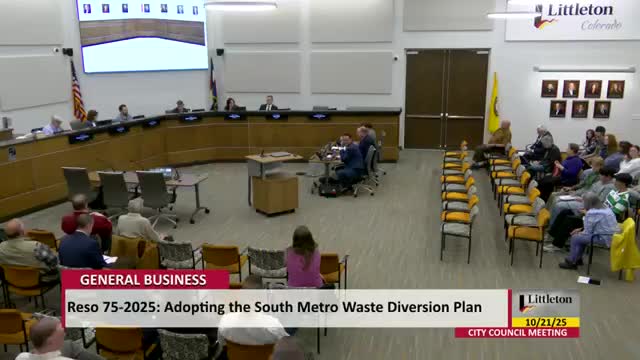Littleton joins regional plan to expand recycling and hauler licensing; council adopts South Metro waste diversion plan
Get AI-powered insights, summaries, and transcripts
Subscribe
Summary
City Council voted 6-0 to adopt the South Metro Waste Diversion Plan, directing staff to pursue outreach, explore hauler licensing and equal-space rules, and return to council with specific ordinances and implementation steps in 2026–2027.
The Littleton City Council on Oct. 21 adopted the South Metro Waste Diversion Plan, a regional blueprint to increase recycling, composting and commercial/multifamily access to diversion services.
The 6-0 vote authorizes staff to continue outreach and data collection and to pursue a phased workplan that includes hauler licensing and an "equal space" ordinance for commercial and multifamily properties.
The nut graf: The plan, developed with Englewood, Centennial and Sheridan and supported by technical assistance from the Colorado Circular Communities Enterprise (C3) and STEPS, sets regional goals and a timeline that reserves detailed policy choices — such as fee schedules or mandatory service requirements — for later council review. Adoption gives staff authority to research options, coordinate with neighboring cities and bring draft ordinances back for formal action.
City staff said the plan is a multiyear effort. Laura Rosenbaum, Littleton's sustainability coordinator, told the council the plan is a “blueprint” for the region and stressed the next steps are research, outreach and ordinance development. “We are hoping tonight that you'll adopt the South Metro waste diversion plan,” Rosenbaum said during the presentation.
Key points from staff and council discussion
- Regional partnership and technical support: The plan was created through a South Metro collaboration among Littleton, Englewood, Centennial and Sheridan with C3 (Colorado Department of Public Health and Environment program) and contracted subject-matter experts (STEPS).
- Goals and near-term timeline: Staff outlined a timeline that prioritizes community outreach in 2026; development of a hauler licensing program and an equal-space ordinance (which requires commercial and multifamily buildings to provide equivalent space for trash and recycling dumpsters) in 2026 with a likely launch in 2027, and a later, larger study on organics/food-waste diversion and a regional recycling drop-off hub targeted for 2027 and beyond.
- Funding and state law context: Rosenbaum and council discussed the state's recent extended producer responsibility (EPR) law and its funding mechanisms. Staff said EPR funding could subsidize recycling and that communities with contracted single-hauler systems may access state funds sooner.
- Household impacts and rate design: Council members asked whether licensing fees would be borne by haulers or passed to customers. Staff said licensing is typically levied on haulers and that Englewood’s experience shows licensing did not increase resident rates; Englewood reportedly uses licensing revenue to support program administration. Staff emphasized that the licensing program is also intended to collect consistent data from haulers.
- Streets, noise and truck impacts: Council and the public asked about the impacts of many haulers on street wear and noise. Staff said Littleton currently has many haulers (roughly 14–17 companies) and multiple trucks per company; a consolidated or licensed system can reduce redundant truck traffic and long‑term pavement wear.
Council direction and next steps
Council adopted the plan by motion and vote. Staff will continue regional coordination and public engagement, develop draft hauler licensing language and an equal-space ordinance, and return to council before implementation so that specific requirements and any fee schedules can be adopted by ordinance or resolution.
Ending: Council members thanked staff for the multi-jurisdictional work and emphasized continued public outreach before any mandatory changes are adopted.
